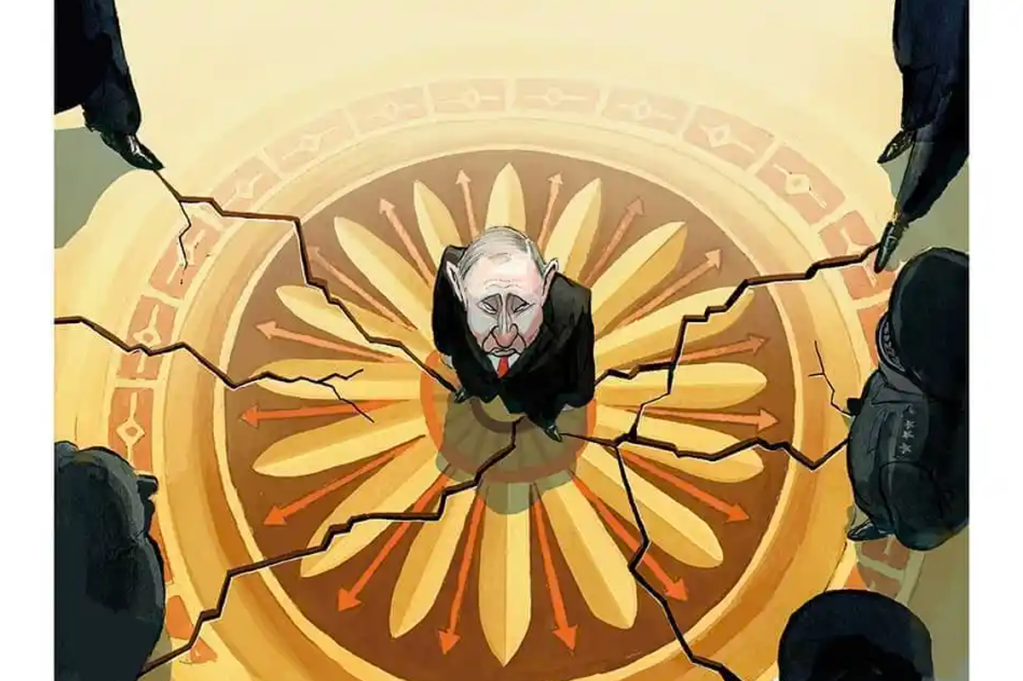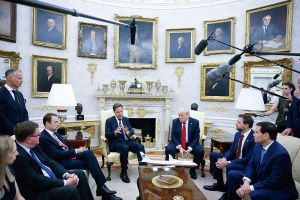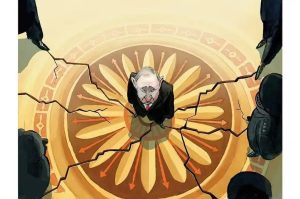As Vladimir Putin geared up to commemorate the eightieth anniversary of the end of the Siege of Leningrad, all the chatter pointed to a second wave of mobilization to prop up Russian troops struggling to hold on to occupied Ukrainian territories.
But the Russian president announced no such thing. Instead, addressing veterans and workers at a weapons factory in St. Petersburg on Wednesday, he rallied Russians with promises of an “assured victory” and pledged that he was trying to end the war. It was, in the end, a rather anti-climactic message. Vladimir Rogov, the Kremlin appointed head of Russian-occupied Zaporizhzhia had promised “a very important statement,” before the speech while western and Ukrainian intelligence officials predicted another mobilization drive. Kremlin spokesman Dmitry Peskov even had to weigh in to curb the enthusiasm, denying plans to call up more troops.
Of course, Kremlin denials will not prevent Putin from announcing a further mobilisation if he so chooses. It certainly didn’t stop him in September, when a “partial” drive was announced calling up 300,000 people. But right now, Putin’s rollercoaster of drummed-up drama followed by fiery but ultimately insubstantial rhetoric is a symptom of a leader running out of options, while shopping for more.
With the one-year anniversary of Russia’s full-scale invasion approaching, the Kremlin is digging in for the long-haul, and Putin has been preparing the population for a long-term war. The president is focusing on reframing the message away from a short and tactical “military operation” to a war of survival — indeed, he used the word “war” for the first time in a statement on December 22. To that end, in December he ordered the Culture Ministry to prepare a series of documentaries on the operation in Ukraine and the fight against “neo-Nazism.”
But this pivot to propaganda indicates a growing recognition in the Kremlin that the aims of the military operation are not likely to be achieved. Nor is the much-touted mobilization really on the cards either. Last month, Putin announced that of the 300,000 mobilized in the previous wave, 150,000 had been sent to Ukraine. That means that 150,000 are still undergoing training. And even pro-Kremlin pundits are quick to point out the obvious: the government is struggling to prepare and, most importantly, arm them with modern kit. Its military structure doesn’t currently have the capacity to absorb more recruits, and sanctions are going to make it harder to arm the ones it has.
This may explain the prominence of businessman Yevgeny Prigozhin’s Wagner private military company, which recently took the credit for the capture of Soledar. But it also places the Kremlin in a precarious position: amplifying its message of “assured victory” amid a growing awareness of the country’s lack of resources.
Are Putin’s comments about trying to end the war genuine? On one level, it’s a signal that the Russian leader has to send, to make the “existential” struggle he is forcing on average Russians just a little more palatable. In December, Putin already raised eyebrows when he claimed Russia’s goal was “not to spin the flywheel of military conflict, but, on the contrary, to end this war.” But on another level, Putin is sending a different type of signal entirely, one directed at the West, and one characteristic of a leader who likes to shop around for options. This signals says that this is a long-haul war for Russia’s survival, we have nothing to lose, but offer us an appealing exit strategy, and we’ll think about it.
The Kremlin doesn’t look anywhere close to being ready to negotiate with Ukraine, given their rejection of President Volodymyr Zelensky’s proposed peace plan. But the costs of the war are mounting for Russia, and as they continue to rise so the possibility of talks with the Kremlin should not be discounted.
After all, at the heart of Putin’s rhetoric is a reckoning with a reality that not only are Russia’s capabilities for mobilization limited, but that the population may not accept another recruitment campaign. The previous one cost the country hundreds of thousands of people who fled abroad, and increasingly the wives and mothers of those sent to fight are starting to protest against the war. And while Putin may claim that victory is assured, he is also saying that Russia is fighting for its survival. That may be because Putin doesn’t have any idea what, exactly, a victory would look like.
This article was originally published on The Spectator’s UK website.

























